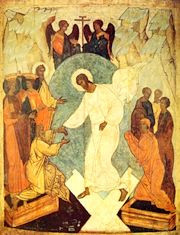Difference between revisions of "Pascha"
m (added category: feasts) |
(icon) |
||
| Line 1: | Line 1: | ||
| + | [[Image:Pascha.jpg|right|frame|The Resurrection of Christ]] | ||
'''Pascha''' is either '''[[Orthodox]] Easter''' or the '''[[Resurrection]] of the [[Lord Jesus Christ|Lord]]'''. It is a transliteration of a Greek word, which is itself a transliteration of the Hebrew ''pesach'', both words meaning ''passover''. The English word ''Pasch'' carries the same meaning and is preferred by a small minority of [[Orthodox]] [[Christian|Christians]], notably the Monks of [[New Skete (Cambridge, New York)|New Skete]]. Some Orthodox Christians discourage the use of the word ''Easter'', believing that the term has roots in pagan rites of the spring equinox and overtones of fertility. | '''Pascha''' is either '''[[Orthodox]] Easter''' or the '''[[Resurrection]] of the [[Lord Jesus Christ|Lord]]'''. It is a transliteration of a Greek word, which is itself a transliteration of the Hebrew ''pesach'', both words meaning ''passover''. The English word ''Pasch'' carries the same meaning and is preferred by a small minority of [[Orthodox]] [[Christian|Christians]], notably the Monks of [[New Skete (Cambridge, New York)|New Skete]]. Some Orthodox Christians discourage the use of the word ''Easter'', believing that the term has roots in pagan rites of the spring equinox and overtones of fertility. | ||
Revision as of 17:07, January 15, 2005
Pascha is either Orthodox Easter or the Resurrection of the Lord. It is a transliteration of a Greek word, which is itself a transliteration of the Hebrew pesach, both words meaning passover. The English word Pasch carries the same meaning and is preferred by a small minority of Orthodox Christians, notably the Monks of New Skete. Some Orthodox Christians discourage the use of the word Easter, believing that the term has roots in pagan rites of the spring equinox and overtones of fertility.
Pascha normally falls between one and five weeks later than Easter as observed by Christians who follow the Gregorian calendar. However, occasionally the two observances coincide. The reason for the difference is that the older Julian calendar uses a different formula for calculating the date of Pascha. This formula was determined by the First Ecumenical Council.
